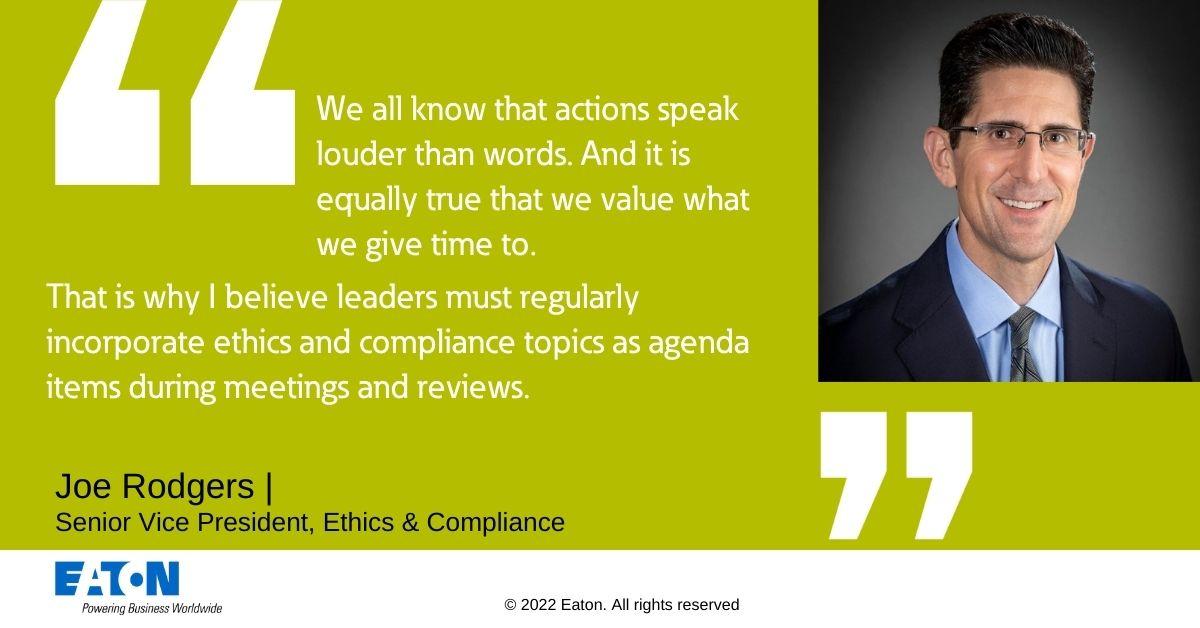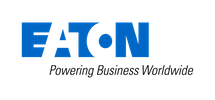Eaton Leadership Insights: Want Better Business Results? Try Ethics.
By Joe Rodgers

Recently I listened to a TED Talk by Erika Cheung, one of the key whistleblowers in the Theranos scandal, who asks, “How do we make speaking up the norm and not the exception?” As Eaton’s Senior Vice President of Ethics and Compliance, I believe we should all be asking that same question every day. When speaking up is part of the company culture, employees feel empowered. When it is not, employees feel powerless and companies pay the price.
To avoid a culture of silence, I believe companies must take an intentional approach to ethics. First, it must be clear across the enterprise that everyone owns ethics. Second, leadership must set the tone from the top and, more importantly, walk the talk by modeling courageous and ethical behavior and encouraging their teams to do the same. As our Chairman and CEO, Craig Arnold puts it: “Doing business right must be at the core of all we do” and cascade “throughout the organization.” We cannot treat ethics as separate from the business strategy; rather, we must incorporate ethics into the business strategy itself.
We all know that actions speak louder than words. And it is equally true that we value what we give time to. That is why I believe leaders must regularly incorporate ethics and compliance topics as agenda items during meetings and reviews. They should also routinely share ethics and compliance data, trends and lessons learned with their teams. Most importantly, companies must prioritize ethics at the highest levels. This means the Ethics and Compliance team should serve as business partners and have a seat at the table during strategic planning sessions and operating reviews. That is what we do at Eaton.
To evaluate whether your company is building this type of culture, I encourage leaders to ask a few pivotal questions: Does your company define ethics and compliance by a once-a-year, mandatory training exercise? Or are your leaders consistently reinforcing an environment where employees are comfortable reporting concerns? Does your company view ethics as everyone’s responsibility—or as something only periodically discussed?
Transparency is critical—with the board, with employees and with stakeholders generally. I have also found that publishing an annual ethics report is invaluable. At Eaton, we call it our “Integrity Report.” It further clarifies a company’s commitment to ethics and creates an opening for discussion. And it can help build trust. By sharing key metrics, investigations and learnings, employees are more confident speaking up because they see and feel the commitment of their enterprise. I also find that publishing ethics-focused interviews with leaders and consistent messaging across multiple platforms can reinforce a culture of ethics.
It is encouraging to see, but not surprising, that a values-based culture can even build a more profitable company. How? Ethical companies often see higher engagement, more productivity and lower turnover. According to the Ethisphere Institute, a leader in defining and advancing the standards of ethical business practices, the world’s most ethical companies in 2022 outperformed a comparable index of large-cap companies by 24.6 percentage points from January 2017 to January 2022.
There is more. Another report revealed managers who frequently discussed ethics and compliance found their employees to be:
- Two times more likely to be comfortable approaching their manager with concerns or questions;
- Ninety percent more likely to have faith in their manager’s commitment to non-retaliation; and
- Twenty-four percent more likely to believe they have a personal responsibility for making sure the company does the right thing.
Today, customers and stakeholders not only expect—but demand—that companies behave ethically, transparently and sustainably. As business leaders, we all have a responsibility to deliver on those expectations.

